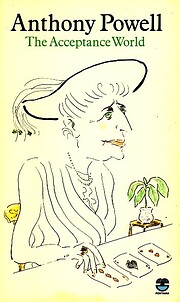

Auf ein Miniaturbild klicken, um zu Google Books zu gelangen.
|
Lädt ... Die neuen Herren. Ein Tanz zur Musik der Zeit (1955)von Anthony Powell

  ) )The third volume of Powell's Dance is the best yet, although I still can't justify giving it 4 stars. The project as a whole seems to be a dashed impressive achievement, and individual moments are also fantastic, but at a book-by-book level I don't think any work thus far has impressed as much as Powell's precise, anthropological contemporaries Evelyn Waugh or Barbara Pym. Nick Jenkins is now in his late 20s, carving out a career for himself at the height of the Great Depression, embarking on a relationship, and navigating his own future. But we hear about these things only in passing. Jenkins, as ever, is something of a cipher, designed to be our tour guide through the 20th century rather than our focal point. We again meet many of the regulars - Uncle Giles, LeBas, Jean, Stringer, Widmerpool, Templer - and a host of new or vaguely familiar faces. We again are given some joyful setpieces and some dense conversations about art and literature, which make it clear that several of the characters are based on real-life figures, many of whom have faded from view after many decades. But above this, two things seem to matter most to Powell. First, capturing the age. After WWII, when Powell was finally able to write these novels, his main goal was to try and chronicle a particular part of the pre-war era for posterity. The people exist to be mouthpieces for views, to be canvases on which the author can draw the changes of a generation, and this differentiates him a great deal from Proust, with whom he is often compared. Powell's other goal, clearly, is to try and create, as it were, time on the page. I realise now that reading these first three books in quick succession is almost contrary to Powell's intention. Jenkins ages five years between each book, and shares with us his confusion and gradual process of remembering people when they flit in and out of his life. I have occasionally been annoyed at the way the narrator will say "I almost recognised the long legs, I wondered if I could have met this person before" while we're saying "OF COURSE YOU HAVE! IT'S MONA FROM THE LAST BOOK! YOU FOOL!". But when placed in perspective, I'm coming to enjoy the way Powell accurately creates figures whose lives and personalities have moved continuously on, stopping only for a moment, or an hour, or a weekend, to interact with Jenkins again. I am now roughly the same age as Jenkins will be in the next volume, At Lady Molly's, and perhaps this is why I am coming to enjoy the series more as it progresses. I still find myself surprised that it's been 15 years since highschool, 10 since university, and that so many of the faces who were important to me in those times have changed beyond belief. Sometimes physically, sometimes ideologically, or emotionally, politically, aspirationally. Sometimes in a humorous way, sometimes with a turn toward the tragic. Close relationships have appeared from unexpected quarters, while others seem unable to be salvaged despite remaining forever important to me for what they were, in a particular time and place. In spite of this, I'm a little curious as to where Powell is going with all this. Is it to be another 9 novels of running into his school chums on occasion? Will this formula wear thin? Or is there something more lasting waiting in the wings? Well, I've got quite a journey yet to undertake, and I'm in no hurry. All in good time. I’ve hit my stride with Powell in this one. Enjoyed the first one, then put down the second halfway though only to reread it a couple years later in a more ready state of mind I guess? Went right to the third one and am now fully hooked. Read this and book two over a few days home locked up with COVID keine Rezensionen | Rezension hinzufügen
Gehört zur ReiheIst enthalten inHat ein Nachschlage- oder BegleitwerkBemerkenswerte Listen
A DANCE TO THE MUSIC OF TIME chronicles the lives of over three hundred characters, and is a unique evocation of life in twentieth-century England. It is unrivalled for its scope, its humour and the enormous pleasure it has given to generations. THE ACCEPTANCE WORLD follows Nicholas Jenkins, Kenneth Widmerpool and others, as they negotiate the intellectual, cultural and social hurdles which stand between them and the 'Acceptance World'. Keine Bibliotheksbeschreibungen gefunden. |
Aktuelle DiskussionenKeineBeliebte Umschlagbilder
 Google Books — Lädt ... Google Books — Lädt ...GenresMelvil Decimal System (DDC)823.912Literature English & Old English literatures English fiction Modern Period 1901-1999 1901-1945Klassifikation der Library of Congress [LCC] (USA)BewertungDurchschnitt: (3.76) (3.76)
Bist das du?Werde ein LibraryThing-Autor. |
||||||||||||||||||||||||||||||||||||||||||||||||||||||||||||||||||||||||||||||||||||||||||||||||||||||||||||||||||||||||||||||||||||